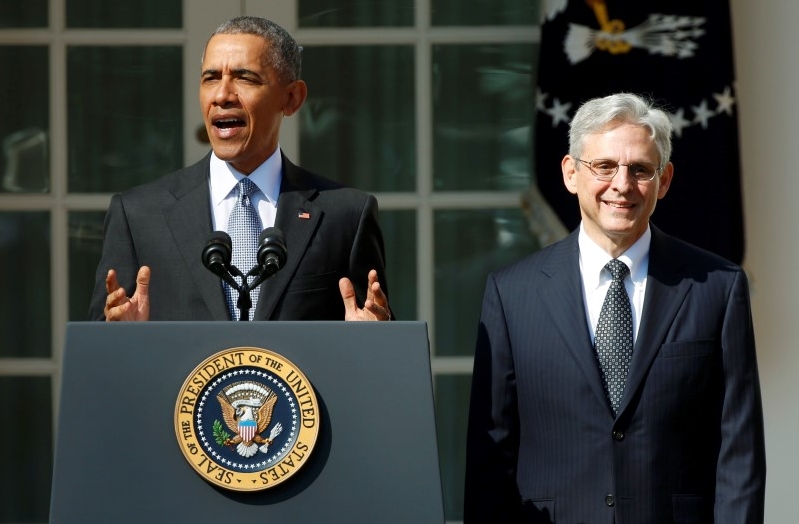
U.S. President Obama has officially nominated Merrick B. Garland, 63, as the nation's 113th justice to succeed Justice Antonin Scalia, who died suddenly in February.
"Of the many powers and responsibility that the Constitution vests in the Presidency, few are more consequential than appointing a Supreme Court Justice, particularly one to replace Justice Scalia...they safeguard our rights, they ensure that our system is one of laws and not men," Obama said in a speech delivered at the Rose Garden on Wednesday morning while flanked by Garland. "This is not a decision I take lightly...That's why over the past several weeks I've done my best to set up a rigorous and comprehensive process."
He added that he sought the advice of both Democratic and Republican leaders before making the decision: "Today, after completing this rigorous process, I've made my decision..to nominate Merrick B. Garland."
Obama praised Garland, who is of the Jewish faith, for demonstrating "decency, modesty integrity, even-handedness, and excellence" that has earned him "the respect and admiration of leaders from both sides of the aisle" and enabled him to be "uniquely prepared to serve immediately."
"Throughout his career, Chief Judge Garland has shown a rare ability to bring people together and has earned the respect of everyone he has worked with," he said. "Chief Justice John Roberts, Garland's colleague on the D.C. Circuit, once said that 'anytime Judge Garland disagrees, you know you're in a difficult area.'"
The President asked Republicans in the Senate to give Garland a "fair hearing": "If not...it will provoke an endless cycle of more tit-for-tat..the reputation of the Supreme Court will inevitably suffer," he said.
In turn, an emotional Garland referred to the decision as "the greatest honor" of his life: "For me, there could be no higher public service than serving as a member of the United States Supreme Court," he said.
According to Time, Garland, a well-known moderate, previously served as chief judge of the U.S. Court of Appeals for the District of Columbia Circuit. He worked in the U.S. Department of Justice as a Special Assistant to the Attorney General between 1979 and 1981, and served as an Assistant U.S. Attorney in D.C. after leaving the private sector and before joining the U.S. Department of Justice.
Garland has served on the appellate level since 1997, when he was nominated by President Bill Clinton and confirmed by the U.S. Senate. Two years earlier, he had also been nominated to the court but his nomination was stalled by Senate Republicans. Obama had considered Judge Garland for the high court in 2009, but instead chose Sonia Sotomayor.
The president first announced he had made a decision in an email sent to supporters.
"As President, it is both my constitutional duty to nominate a Justice and one of the most important decisions that I -- or any president -- will make," he wrote. "I've devoted a considerable amount of time and deliberation to this decision. I've consulted with legal experts and people across the political spectrum, both inside and outside government. And we've reached out to every member of the Senate, who each have a responsibility to do their job and take this nomination just as seriously."
He also highlighted three principles that reflect the role the Supreme Court plays in our democracy. First, a Justice should possess an independent mind, unimpeachable credentials, and an unquestionable mastery of law. Second, a Justice should recognize the limits of the judiciary's role. Third, a judge must have a "keen understanding that justice is not about abstract legal theory, nor some footnote in a dusty casebook."
"I'm confident you'll share my conviction that this American is not only eminently qualified to be a Supreme Court Justice, but deserves a fair hearing, and an up-or-down vote," he wrote.
The New York Times notes that after the death last month of Mr. Scalia, a leading conservative, the court is evenly divided, with four liberal justices and four conservatives. The new Justice, who is viewed as a "compromise choice," could be the deciding vote in several close cases.
Rafael Cruz, father of Republican presidential candidate Ted Cruz, echoed this concern in an exclusive interview with The Gospel Herald last month.
"Today, one of the most critical issues that we need to be aware of is, with the passing of Antonin Scalia, the balance in our Supreme Court is so precarious," he said at the time. "If we have one more liberal justice in the Supreme Court, our right to life is down the tubes. Abortion on demand until the day of delivery will become the law of the land, and our Second Amendment rights to keep and bear arms will go down the drain. If you look at history, every country that has taken guns away from the people has used them against the people. Stalin did it, Hitler did it, Mao did it."
He added, "We must be certain that we elect a true Constitutional Conservative as president that will only appoint justices that are true to the Constitution, to the rule of law, to limited government. If we get this wrong, it may cost us a generation, and I don't think we have the time. America is at the point of disaster if we make the wrong decision. "







